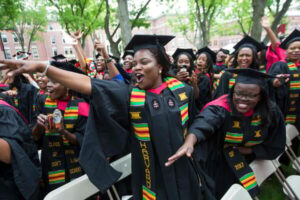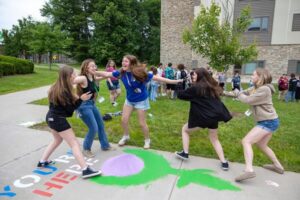
3 Questions for Online Learning Pioneer Robert Ubell
Whenever I write something halfway decent (sometimes) or astoundingly dumb (often), I can count on a thoughtful response from Bob Ubell. Our conversation took place during the period when Bob published two books, Going Online (2017) and Staying Online (2021), as well as numerous articles in EdSurge, IHE, The Evollution and other publications.
Bob’s online education career goes at least back to 1999, where he was the dean of online learning at Stevens Institute of Technology. Subsequent leadership roles include vice dean of online learning at New York University Tandon School of Engineering and vice dean emeritus, online learning, at NYU Tandon.
Bob is a 2011 Fellow of the Online Learning Consortium and a member of the Advisory Board of Online Learning. In 2012, the Online Learning Consortium (then called the Sloan Consortium) awarded Bob with the A. Frank Mayadas Leadership Award, the organization’s “highest individual recognition for leadership in online education.” Most recently, Bob took up a role serving on the CHLOE Advisory Panel for the Quality Matters Changing Landscape of Online Education Project.
In a profession where many of us are making things up as we go, Bob stands out for his long-term experience thinking about and leading online learning initiatives. I asked Bob if he would answer my questions about his career and the future of online learning, and he graciously agreed.

Q: According to your Wikipedia page, you have been working at the intersection of higher education, technology and publishing since you graduated from Brooklyn College in 1961. What does the next decade hold for you as you think about your contributions to our online learning community?
A: I’m not optimistic about what’s ahead, not only for digital education, but also for the nation’s wider academic enterprise. It’s impossible to answer your question in isolation without reckoning with the ugly scene now taking place in higher ed. Challenged by the federal government’s attacks, early this spring, 600 higher ed leaders warned about “unprecedented government overreach and political interference now endangering American higher education.” Since then, the present administration has continued to follow a treacherous path, destabilizing campuses across the country, targeting faculty and student academic freedom, and, in a new Supreme Court decision, ultimately dismantling the U.S. Department of Education.
In an opinion column in this publication earlier this year, I predicted that American colleges and universities faced a terrifying cascade of autocratic moves “set by leaders in Hungary, Turkey and elsewhere … selecting college presidents, controlling faculty hiring and advancement, punishing academic dissent and imposing travel restrictions.” Many of these despotic actions have already been implemented and continue to be imposed on schools in this country.
Last month, to restore about $400 million in federal research funding, Columbia University bowed to tyrannical demands by officials. In an unprecedented agreement, Columbia will pay more than $200 million in fines for dubious accusations of antisemitic student theatrics. It also opened the gates for government intrusion in the school’s academic prerogatives in hiring, admissions and curriculum. Keeping Columbia in academic handcuffs, the deal will be overseen by an outside monitor, reporting to officials every six months.
The midcentury philosopher and cultural critic Hannah Arendt, in her masterful account of totalitarian regimes, revealed that they rely on systematic suppression of individual thought and freedom to maintain control, undermining the very purpose of universities—institutions that encourage critical thinking, open debate and intellectual autonomy, essential in a democracy. Recent power plays against Columbia, Harvard, Brown, Duke—and, just this week, UCLA—show how brutal our government can be in imposing its will.
The noted Columbia genocide scholar Marianne Hirsch, the daughter of Holocaust survivors, who teaches a class on genocide with a book by Arendt, is considering leaving Columbia following its adoption of a new definition of antisemitism, which casts criticism of Israel as hate speech, a provision in the new pact with the federal government. Hirsch fears it may force her to face official sanction for even mentioning Arendt, who criticized Israel’s founding.
“A university that treats criticism of Israel as antisemitic and threatens sanctions for those who disobey is no longer a place of open inquiry,” Hirsch told the Associated Press. “I just don’t see how I can teach about genocide in that environment.” Reactionary governments always find an innocent mark to target. In the 1950s, it was American Communists. Today, it’s pro-Palestinian faculty and students.
The downstream effects on remote learning are already being felt, with the perception overseas—following arrests of foreign students and other threats against students and scholars from abroad—that the U.S. is turning its back on international recruitment, undermining our reputation as a leading destination for higher education and potentially impacting foreign student tuition revenue, face-to-face and online. In the U.S., the demand to shut down DEI programs will surely affect the greatest number of online students—80 percent of whom work and a third [of whom] are first in their families to attend college.
On a personal note, I worry that closing the [Education Department] will cripple and may even end higher ed data collection and reporting, giving us less reliable information on the status of American college students. Over my career in higher ed, I’ve depended on federal government data, especially in supporting findings I’ve disclosed in my writing. “We’ll soon be in the dark,” I warned in a recent IHE column.
Turning to your question, asking what sort of contribution I might make to the remote learning community. Like so many others, I don’t feel my voice possesses much force against what’s happening. Nor do I feel competent to articulate what might make a difference. Academic opposition to what we face has been scattershot and largely ineffective, except for various successful legal maneuvers. More broadly, on a national scale, resistance has been disappointing, with few voices, in and out of electoral politics, with enough momentum to capture our yearning for democratic fresh air. To get us out of this nightmare, I dream that someone will rise in this desperate time to gather all of us together in an inspiring and powerful national movement against tyranny.
Q: There is a growing concern across higher education about the job market for new college graduates, as employers are increasingly utilizing AI to accomplish the work previously done by entry-level workers. What role should online learning leaders be playing at our institutions in evolving and adapting our institutions to the AI revolution?
A: Since the pandemic, it hasn’t been that easy for recent college graduates to find a job in our digital economy–even before the invasion of AI. In March, recent college grad unemployment was at 5.8 percent, the highest in the last decades, excluding the pandemic, and nearly double the rate of all workers with a college degree, now at 2.7 percent, nearly a historic low.
“For the first time in modern history, a bachelor’s degree is failing to deliver on its fundamental promise: access to professional employment,” observes a troubling report from Burning Glass, the big labor market analysis firm. “Young graduates face unemployment rates that are rising faster than any other education or age cohort, while over half of them land into jobs they didn’t need college to get. The traditional pathway from college to career is becoming less reliable.” In addition to other causes, the report singles out AI.
As with all radical technological innovations, the reception of AI is fraught with contradictory predictions on its impact. Touted by champions as an economic miracle, others fear it as a devilish intrusion, disrupting our material well-being, especially for college grads who have historically outpaced the economic success of others. In the postwar years, most American workers found middle-class manufacturing or clerical jobs, but in the last 40 years, new jobs are either in highly paid professional fields or low-wage service industries, a disastrous national calamity that has largely generated our present political trouble.
Sorry, but I don’t have exciting new ways to recommend to recent college grads to extricate themselves from the present dilemma, other than—not a very original idea—encourage them to enhance their knowledge gained in college classrooms with online or in-person nondegree courses in AI and other technical disciplines, giving them a leg up with attractive additional credentials.
Not being knowledgeable about AI, I reached out to Alfred Essa, an insightful colleague and author of the forthcoming Artificial Intelligence: Shaping the Future of Innovation, who advised, “Students must think of themselves as designers, creating AI-powered applications to solve problems, not just in the short-term, but over their careers, positioning themselves in industry, capable of building and changing things with AI.” Essa emphasized that his advice is not only for technically savvy students, but for others who are creative in aesthetics, humanities and other disciplines.
Essa worries that the present higher ed leadership is obsolete. “For colleges to succeed,” he urged, “they must be led by a new generation who will adopt the new AI environment.” In the meantime, for my part, higher ed needs to welcome AI as a technical innovation, in the long tradition of typewriters, calculators, computers and digital education. Once the genie is out of the bottle, you can’t stick it back in. Restrictive, retrograde rules are foolish or punishing—or both.
Q: What advice do you have for folks like me who are thinking about ways to stay active and engaged in online learning and higher education once we retire from our university administrative roles?
A: Cicero found that the way we lived in our youth prepares us for retirement. The choices we made when we were young naturally lead to the life we will live as we age. He argued that preparation for our later years is not a separate phase, but a continuation of the life we led all along. “The harvest of old age is the recollection and abundance of blessings previously secured,” he wrote (Cicero De Senectute, translated with an introduction and notes by Andrew P. Peabody [Boston: Little, Brown, and Co., 1887]).
Source link



